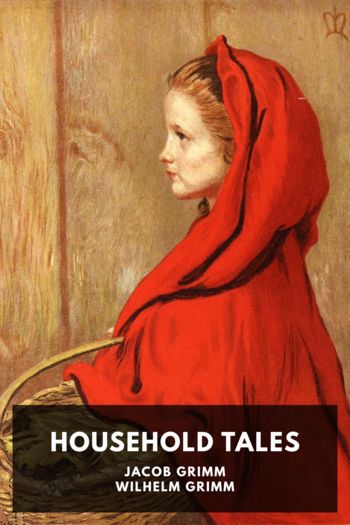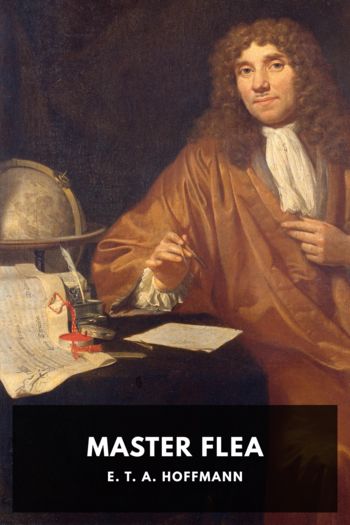Household Tales - Jacob Grimm (read me a book .txt) 📗

- Author: Jacob Grimm
Book online «Household Tales - Jacob Grimm (read me a book .txt) 📗». Author Jacob Grimm
“And yet there shall be a meal,” answered the youth, “and better than any thou hast ever tasted.” Thereupon he brought his cloth out of his knapsack, spread it on the ground, and said, “Little cloth, cover thyself,” and instantly boiled meat and baked meat stood there, and as hot as if it had just come out of the kitchen. The charcoal-burner stared, but did not require much pressing; he fell to, and thrust larger and larger mouthfuls into his black mouth.
When they had eaten everything, the charcoal-burner smiled contentedly, and said, “Hark thee, thy tablecloth has my approval; it would be a fine thing for me in this forest, where no one ever cooks me anything good. I will propose an exchange to thee; there in the corner hangs a soldier’s knapsack, which is certainly old and shabby, but in it lie concealed wonderful powers; but, as I no longer use it, I will give it to thee for the tablecloth.”
“I must first know what these wonderful powers are,” answered the youth.
“That will I tell thee,” replied the charcoal-burner; “every time thou tappest it with thy hand, a corporal comes with six men armed from head to foot, and they do whatsoever thou commandest them.”
“So far as I am concerned,” said the youth, “if nothing else can be done, we will exchange,” and he gave the charcoal-burner the cloth, took the knapsack from the hook, put it on, and bade farewell.
When he had walked a while, he wished to make a trial of the magical powers of his knapsack and tapped it. Immediately the seven warriors stepped up to him, and the corporal said, “What does my lord and ruler wish for?”
“March with all speed to the charcoal-burner, and demand my wishing-cloth back.” They faced to the left, and it was not long before they brought what he required, and had taken it from the charcoal-burner without asking many questions. The young man bade them retire, went onwards, and hoped fortune would shine yet more brightly on him. By sunset he came to another charcoal-burner, who was making his supper ready by the fire.
“If thou wilt eat some potatoes with salt, but with no dripping, come and sit down with me,” said the sooty fellow.
“No, he replied, this time thou shalt be my guest,” and he spread out his cloth, which was instantly covered with the most beautiful dishes. They ate and drank together, and enjoyed themselves heartily.
After the meal was over, the charcoal-burner said, “Up there on that shelf lies a little old worn-out hat which has strange properties: when anyone puts it on, and turns it round on his head, the cannons go off as if twelve were fired all together, and they shoot down everything so that no one can withstand them. The hat is of no use to me, and I will willingly give it for thy tablecloth.”
“That suits me very well,” he answered, took the hat, put it on, and left his tablecloth behind him. Hardly, however, had he walked away than he tapped on his knapsack, and his soldiers had to fetch the cloth back again. “One thing comes on the top of another,” thought he, “and I feel as if my luck had not yet come to an end.” Neither had his thoughts deceived him. After he had walked on for the whole of one day, he came to a third charcoal-burner, who like the previous ones, invited him to potatoes without dripping. But he let him also dine with him from his wishing-cloth, and the charcoal-burner liked it so well, that at last he offered him a horn for it, which had very different properties from those of the hat. When anyone blew it all the walls and fortifications fell down, and all towns and villages became ruins. He certainly gave the charcoal-burner the cloth for it, but he afterwards sent his soldiers to demand it back again, so that at length he had the knapsack, hat and horn, all three. “Now,” said he, “I am a made man, and it is time for me to go home and see how my brothers are getting on.”
When he reached home, his brothers had built themselves a handsome house with their silver and gold, and were living in clover. He went to see them, but as he came in a ragged coat, with his shabby hat on his head, and his old knapsack on his back, they would not acknowledge him as their brother. They mocked and said, “Thou givest out that thou art our brother who despised silver and gold, and craved for something still better for himself. He will come in his carriage in full splendour like a mighty king, not like a beggar,” and they drove him out of doors. Then he fell into a rage, and tapped his knapsack until a hundred and fifty men stood before him armed from head to foot. He commanded them to surround his brothers’ house, and two of them were to take hazel-sticks with them, and beat the two insolent men until they knew who he was. A violent disturbance arose, people ran together, and wanted to lend the two some help in their need, but against the soldiers they could do nothing. News of this at length came to the King, who was very angry, and ordered a captain to march out with his troop, and drive this disturber of the peace out of the town; but the man with the knapsack soon got a greater body of men together, who repulsed the captain and his men, so that they were forced to retire with bloody noses.
The King said, “This vagabond is not brought to order yet,” and next day sent a still larger troop against him, but they could do even less. The youth set still more men against





Comments (0)